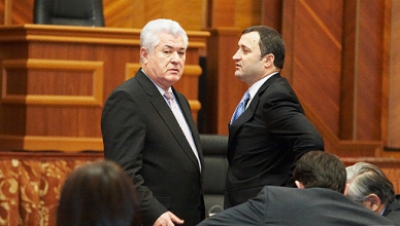
Moldova: European Choice With Communist Support?
Publication: Eurasia Daily Monitor Volume: 12 Issue: 41
By:

Following yet another protracted political crisis, the Moldovan parliament has voted to approve a minority government, the Alliance for a European Moldova (AEM), on February 18, thanks to the Communist Party’s support. The AEM government needed 51 votes for approval. It could only muster 39 votes on its own; but it received 19 Communist votes after negotiations with that party’s leader, Vladimir Voronin, former head of state (2001–2009). Voronin launched the Moldova–European Union Action Plan from 2004 onward, but has gyrated on the question of European integration more than once, from 2009 to date.
The AEM is Moldova’s first ever minority government since the country became independent. Headed by Chiril Gaburici, a successful telecommunications manager without political experience, the new government takes office at a time of unprecedented domestic political fragmentation and Russian challenges.
The AEM consists of the Liberal-Democrat Party under Vlad Filat and the Democratic Party under billionaire Vlad Plahotniuc, which have governed Moldova since 2009, in a coalition of three parties. That coalition’s third component, the Liberal Party of Mihai Ghimpu, posed excessive conditions to its participation in AEM, which proved unacceptable to the AEM parties. A dissatisfied Ghimpu refused to approve the AEM government and withheld his party’s 13 votes (see accompanying article).
That impasse required the AEM to make a parliamentary deal with the Communist Party, at the very least for voting the AEM government in. However, continuing parliamentary cooperation with the Communists will be necessary for stability of the AEM minority government and in society at large.
It may seem paradoxical that a government carrying the Europe brand, in an Eastern Partnership country often held up as an example by the EU, would need the Communists’ conditional support for taking and holding office. In Moldova’s party-political system, however, this is no paradox, but rather the natural order of things; and even the natural order may only last until further notice, given the results of the November 2014 elections.
The three parties that ran under Europe’s colors lost their erstwhile majority: they received a total of 46 percent of the votes cast. Luckily for these parties, at least 10 percent of the votes cast went to small pro-Russia parties that fell below the threshold to enter parliament. This explains why the three parties that carried the Europe brand kept their combined parliamentary majority (totaling 55 seats, out of 101) while losing the popular majority (see EDM, December 2, 3, 5, 9, 2014).
The Party of Socialists (pro-Moscow, trusted there) and the Communist Party (home-grown, mistrusted in Moscow) entered this parliament with 25 and 21 seats, respectively. The Communists have lost about one third of their voters to the Socialists. The two parties compete against each other over overlapping segments of the electorate. The AEM is, itself, divided internally. As a minority government, it must work with the Communists to provide orderly parliamentary processes and to avoid polarization on a 50-50 basis, Reds versus the rest, in Moldova’s society at large. And given Russia’s actions to destabilize Ukraine, particularly in the southeast, Moldova needs to consolidate its fractious domestic front to the extent possible (Ziarul National, February 18).
It is in that regional and domestic context that the AEM explores a modus vivendi with Voronin’s Communists in parliament. AEM’s loss of its former electoral majority makes such a modus vivendi necessary. By the same token, the Communist Party’s steep decline (see above), as well as its recent internal changes, can facilitate a parliamentary agreement with this party.
Voronin eliminated the younger radical element from the party’s leadership already before the electoral campaign. The Communist electorate has become more Moldovan ethnically after the recent elections, as most “Russian-speaking” voters crossed over from the Communists to the Socialists and other pro-Russia (pro–“Eurasian choice”) parties.
Communist leaders no longer call for denouncing or suspending the Moldova-EU association and free trade agreements. Instead, they propose ambiguously to review or revise some unspecified provisions, in consultation with the EU and Russia. The German government proposes the same in Ukraine’s case, which could set a negative precedent for Moldova.
While generally suspicious of Moldova’s cooperation with the North Atlantic Treaty Organization (NATO), the Communists have cleared Filat’s nomination of military expert Viorel Cibotaru as defense minister in the new government. Cibotaru is a longtime proponent of closer ties between “neutral” Moldova and NATO. The Communists also dropped their opposition to Filat’s re-nomination of Maia Sandu as Education Minister. Exceptionally in the former government, Sandu launched an ambitious program to reform her ministry with civil-society support.
The Communist Party does not seek ministerial portfolios in the new government. Voronin and other leaders define the party’s stance as that of a “constructive opposition,” not in power but “monitoring the power.” To that end, the Communists seek to take over the chairmanships of the Audit Chamber, the Audio-Visual Council (media regulator), and Teleradio Moldova (public broadcasting company) supervisory boards, as well as the Central Electoral Commission’s chairmanship. Communist leaders propose to negotiate with the AEM about those posts. (Infotag, February 18, 25, March 3).
Staying out of the government to avoid the responsibilities involved, while monitoring the government and wielding some institutional tools to that effect, is a comfortable posture for the Communist Party to assume. The party’s “constructive opposition” means, essentially, its conditional support to the AEM (Pcrm.md, March 1–5).
Absent an agreement on a parliamentary partnership between them, an informal partnership seems likely to ensue. The Communists would lend their votes to the AEM government on a case-by-case basis (“situational majorities”). This may require negotiations and horse-trading over each governmental initiative in parliament, possibly slowing down reform enactments and the pace of implementing the EU association agreements. An actual agreement on parliamentary partnership would, therefore, be preferable, and in the country’s interest. A clear partnership would replace situational majorities with a more stable and predictable arrangement.
Above and beyond policy considerations, the Communist leadership is vested in stability, self-preservation, and quietly completing this four-year term in parliament. The party’s electorate is shrinking through natural causes in the older age brackets, and crossover to the Socialists and other pro-Russia parties in younger age brackets. Communist leaders, therefore, fear pre-term elections. They also look apprehensively at the local elections that are due to be held this year country-wide. The Socialists look poised to gain more ground at the Communists’ expense. It would be sensible for the AEM and Voronin’s Communists, in this situation, to cooperate in stabilizing Moldova’s politics and containing the advances of pro-Kremlin parties in the country.




